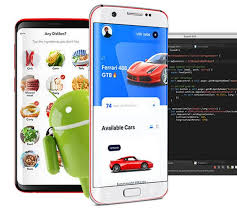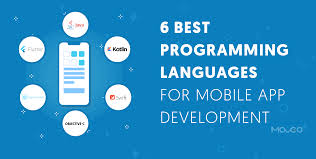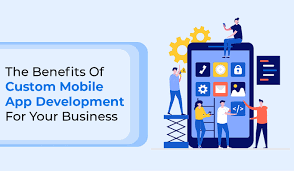Empower Your Creativity with Android App Builder Software
The Power of Android App Builder Software
In the digital age, having a mobile app for your business is essential to reach a wider audience and enhance customer engagement. However, developing an app from scratch can be time-consuming and costly. This is where Android app builder software comes to the rescue.
Android app builder software provides a user-friendly platform that allows individuals and businesses to create customized mobile applications without the need for extensive coding knowledge. With intuitive drag-and-drop interfaces and pre-built templates, users can design and launch their apps quickly and efficiently.
Key Features of Android App Builder Software:
- Drag-and-Drop Interface: Easily add elements such as buttons, images, text boxes, and more to your app layout.
- Customization Options: Tailor your app’s design, color scheme, fonts, and functionalities to align with your brand identity.
- App Preview: Preview your app in real-time on different devices to ensure it looks great on all screen sizes.
- Integration Capabilities: Seamlessly integrate features like social media sharing, push notifications, in-app purchases, and more.
- No Coding Required: Build your app without writing a single line of code, making it accessible to users with varying technical backgrounds.
Whether you are a small business owner looking to create a mobile presence or an individual with a great app idea, Android app builder software empowers you to bring your vision to life efficiently. By streamlining the app development process and eliminating the complexities of traditional coding methods, these tools democratize mobile app creation for everyone.
In conclusion, Android app builder software opens up endless possibilities for individuals and businesses seeking to enter the mobile market swiftly. With its user-friendly interface and robust features, creating a professional-looking app has never been easier. Embrace the power of Android app builder software today and take your digital presence to new heights!
8 Essential Tips for Choosing and Using Android App Builder Software
- Choose a user-friendly app builder software to streamline the development process.
- Ensure the app builder offers a variety of templates to kickstart your project.
- Customize the design elements such as colors, fonts, and layouts to create a unique app.
- Test your app regularly on different devices to ensure compatibility and responsiveness.
- Integrate analytics tools in the app to track user engagement and behavior.
- Optimize images and videos used in the app for faster loading times.
- Implement security measures to protect user data within the app.
- Regularly update your app with new features and improvements based on user feedback.
Choose a user-friendly app builder software to streamline the development process.
When embarking on the journey of creating a mobile app, selecting a user-friendly app builder software can significantly streamline the development process. By choosing an intuitive platform that simplifies app creation with drag-and-drop interfaces and pre-built templates, developers can focus more on designing a functional and visually appealing app rather than getting bogged down in complex coding tasks. This approach not only saves time and effort but also makes app development accessible to individuals with varying levels of technical expertise, ultimately leading to a more efficient and successful mobile app launch.
Ensure the app builder offers a variety of templates to kickstart your project.
When selecting an Android app builder software, it is crucial to ensure that the platform offers a diverse range of templates to kickstart your project. Having access to a variety of templates can significantly expedite the app development process by providing ready-made design structures that align with different app categories and styles. These templates not only save time but also serve as valuable starting points for customization, allowing users to personalize their apps while maintaining a professional look and feel. By leveraging a selection of templates, developers can jumpstart their projects with ease and bring their app ideas to life more efficiently.
Customize the design elements such as colors, fonts, and layouts to create a unique app.
To create a standout app using Android app builder software, it is crucial to leverage the customization options available. By tailoring design elements like colors, fonts, and layouts, users can infuse their app with a unique identity that resonates with their brand or vision. This level of customization not only enhances the app’s aesthetics but also helps in creating a memorable user experience. Whether aiming for a sleek and modern look or a vibrant and playful design, the ability to personalize these aspects empowers app creators to craft an app that truly stands out in the crowded digital landscape.
Test your app regularly on different devices to ensure compatibility and responsiveness.
Regularly testing your app on a variety of devices is crucial to ensure that it functions seamlessly across different screen sizes and operating systems. By conducting thorough compatibility tests, you can identify potential issues early on and make necessary adjustments to enhance the responsiveness and user experience of your app. This proactive approach not only helps you deliver a consistent performance to your users but also demonstrates your commitment to quality and reliability in the competitive world of mobile applications.
Integrate analytics tools in the app to track user engagement and behavior.
By integrating analytics tools into your Android app built with app builder software, you can gain valuable insights into user engagement and behavior. These tools allow you to track user interactions, measure app performance, and understand how users navigate through your app. By analyzing this data, you can make informed decisions to optimize the user experience, enhance features that resonate with your audience, and ultimately improve the overall success of your app in the competitive mobile landscape.
Optimize images and videos used in the app for faster loading times.
To enhance the performance of your mobile application built with Android app builder software, it is crucial to optimize the images and videos used within the app. By compressing and resizing media files appropriately, you can significantly reduce the file sizes without compromising visual quality. This optimization not only ensures faster loading times for users but also helps conserve device storage space. Prioritizing image and video optimization is a smart strategy to improve user experience and overall app efficiency.
Implement security measures to protect user data within the app.
When utilizing Android app builder software, it is crucial to prioritize the implementation of robust security measures to safeguard user data within the app. By incorporating encryption protocols, secure authentication methods, and data protection mechanisms, developers can ensure that sensitive information remains confidential and protected from unauthorized access. Prioritizing user data security not only fosters trust among app users but also demonstrates a commitment to upholding privacy standards in an increasingly digital landscape.
Regularly update your app with new features and improvements based on user feedback.
To maximize the success of your Android app built using app builder software, it is crucial to prioritize regular updates that incorporate new features and enhancements driven by user feedback. By actively listening to your users and implementing their suggestions, you not only demonstrate a commitment to customer satisfaction but also ensure that your app remains relevant and competitive in the ever-evolving digital landscape. Continuous improvement based on user input fosters engagement, loyalty, and ultimately contributes to the long-term success of your app.








